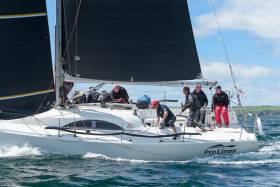Displaying items by tag: Sailmakers
Leading Irish and international Crosshaven-based sailmakers UK/McWilliam are embarking on a fresh stage of development, with a major change in the company’s ownership structure which will draw on and develop the company’s exceptional range of global activities and expertise, providing customers in Ireland and abroad with an enhanced range of services and products writes W M Nixon.
Sailmaker Des McWilliam is to retire at the end of this year, and is selling the Cork loft to Barry Hayes who started his sailmaking career with the Crosshaven firm, his wife Claire Morgan, and Graham Curran who currently works in the Crosshaven loft.
Since its foundation 43 years ago by noted dinghy and offshore racing champion John McWilliam, the firm has been essentially a McWilliam family enterprise. As the business became established, its picturesque headquarters were created in a skillfully and stylishly re-configured former mill at Hoddersfield in the peaceful countryside immediately inland from Crosshaven in County Cork.
But while the scenery may have been gentle, within the loft the production pace was usually hectic as suits of top class sails were turned out for boats of all kinds which were winning races, both in Ireland and at the highest levels of international competition.
Initially, the core of the workforce was John McWilliam and his wife Diana. But after four years, they were joined by John’s brother Des and his wife Sue. The company’s national and international involvement continued to increase, and in a constantly changing production environment with new and ever more sophisticated fabrics and sailing-making techniques coming into use with rapidly-increasing recourse to CAD/CAM, the company developed a range of international contacts and associations which kept them in the forefront of innovation.
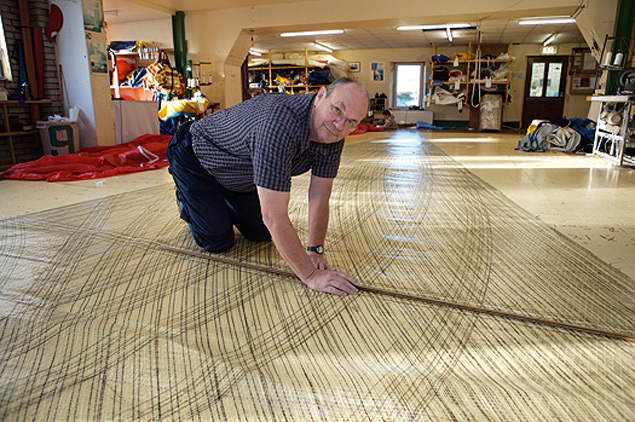 Des McWilliam in the peacefully-located sail loft near Crosshaven. Photo: Robert Bateman
Des McWilliam in the peacefully-located sail loft near Crosshaven. Photo: Robert Bateman
However, although the latest and best in sail-making technology was always to the fore in work on the sail-loft floor, at a marketing level the business was very much built on personal contact and service. The McWilliam brothers and their key employees were always available and enthusiastically willing to show their wide range of customers how to get the best out of their McWilliam sails.
It’s a very demanding if satisfying pace, and after 25 years at the sharp end of world-class sailmaking, John and Diana McWilliam stood down from the leading roles, and for the last 24 years Des McWilliam and a new team of rising talents have been the faces of McWilliam Sailmakers.
The continually evolving environment in which they worked was reflected in the fact that over the years they formed strategic alliances with other sailmakers in order to provide strength in numbers. In 1996 this moved onto a new plane when they became part of the Ulmer Kolius setup, a worldwide group of nearly 50 lofts known as UK Sailmakers, which stemmed originally from a loft established in New York in 1946 by Charlie Ulmer.
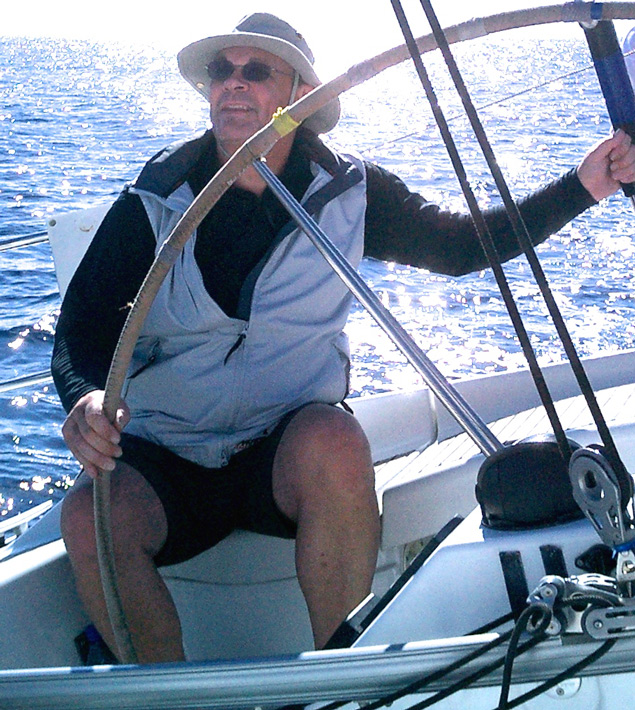 Man at work. Des McWilliam testing the newest suit in his range. In 2011, he was elected in New York for a two year period as global President of UK Sailmakers, a worldwide group with nearly 50 member sail-lofts
Man at work. Des McWilliam testing the newest suit in his range. In 2011, he was elected in New York for a two year period as global President of UK Sailmakers, a worldwide group with nearly 50 member sail-lofts
It says everything for Des McWilliam’s standing in the group that in 2011 at the Annual Meeting in New York, he was elected President of UK Sails in succession to Butch Ulmer himself. This significant honour added to his already hectic work programme, yet for Irish sailors he continued to be the same friendly, informative and ever-willing Des McWilliam, an asset to any boat racing afloat, and the best of company ashore.
But now, after 39 years, he reckons it is time to step down, and by December 2017 he plans to be fully retired. However, he does so in the knowledge that the firm is being taken over by people whom he has trained personally, and who have also benefitted from the worldwide expertise to be gained from being part of the UK Sailmakers Group.
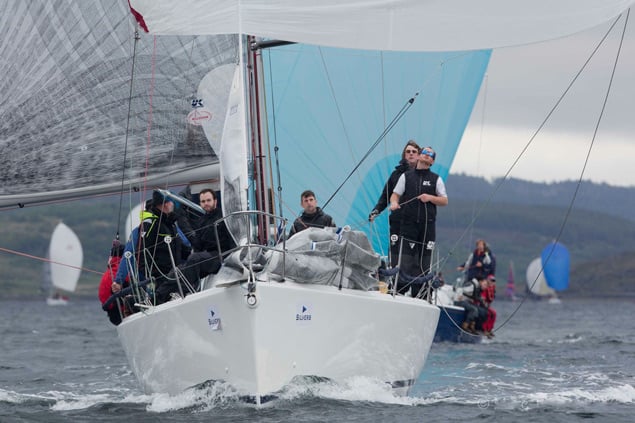 Rob McConnell and Graham Curran trimming Fool’s Gold’s previous UK McWilliam sails at the Scottish Series in Tarbert, in which they are past overall winners. Photo Marc Turner
Rob McConnell and Graham Curran trimming Fool’s Gold’s previous UK McWilliam sails at the Scottish Series in Tarbert, in which they are past overall winners. Photo Marc Turner
The core ownership of the company will now devolve on Barry Hayes and his wife Claire Morgan, and Graham Curran. Of the three, it is Graham Curran who will be best known to today’s generation of front-line sailors in Ireland, as it was he who – working in Crosshaven - master-minded the UK Sailmakers’ new set of threads for Rob McConnell’s A35 Fool’s Gold from Dunmore East for her triumphant line of straight wins in the large Class I in the Sovereigns Cup in Kinsale, concluding last Saturday with Fool’s Gold being the overall champion.
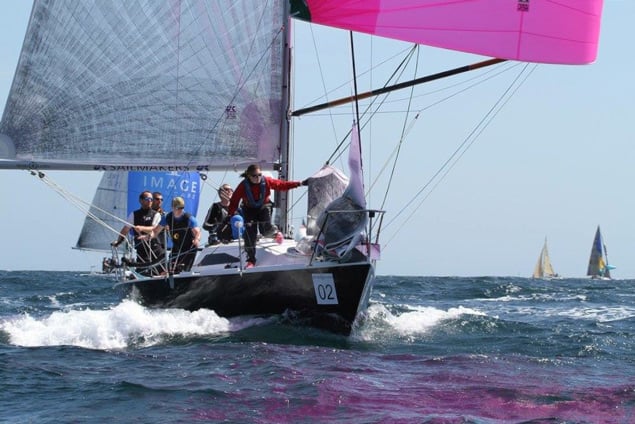 Pink power. The luminous spinnaker supplied to order for the successful Half Tonner Harmony is such a lurid shade of pink that it colours the sea ahead of the boat. Photo: Robert Bateman
Pink power. The luminous spinnaker supplied to order for the successful Half Tonner Harmony is such a lurid shade of pink that it colours the sea ahead of the boat. Photo: Robert Bateman
Next week in the Volvo Dun Laoghaire Regatta, he’ll be with Jonny Swan of Howth on the classic Half Tonner Harmony, racing as title defenders, but he will of course be available for consultation with the many UK McWilliam clients racing in Ireland’s biggest regatta.
His background is interesting, as he emerged from that increasingly productive nursery of sailing talent, Waterford Harbour SC at Dunmore East. From an early age he was keen to be part of a team racing a bigger boat, rather than a solo Optimist or Laser sailor, and it is this which eventually saw him in a key role on Fool’s Gold. However, while he enjoyed sailing more and more with every campaign, somehow the prospect of being a pro or a yacht designer didn’t quite click with him, so he did a course in Computer Game Development in Limerick University, which unexpectedly yet very happily gave him the skill sets to design sails using computers.
Serendipity played a role, for in April 2014 he found himself having a cup of tea with Des McWilliam, who was keen to recruit new talent, but was adamant that whoever was joining the firm would share its ethos of customer service, involving willingness to work all hours and travel long distances. They struck a spark, and Graham Curran has been an increasingly important element in the Crosshaven loft ever since, his significance belying the fact that he has been there just three years.
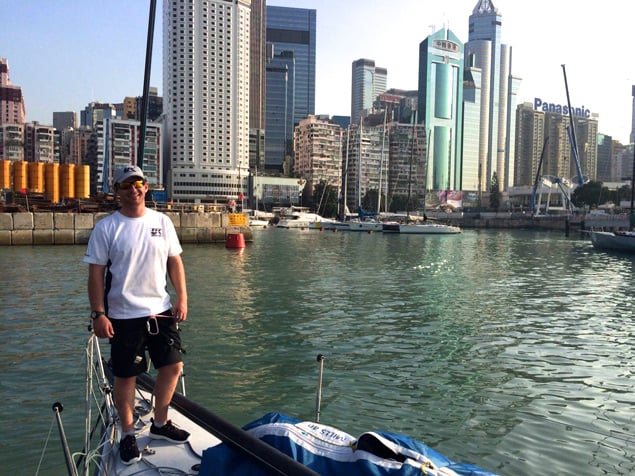 A long way from Crosshaven. Graham Curran in Hong Kong during a visit to the largest UK Sailmakers loft in the world
A long way from Crosshaven. Graham Curran in Hong Kong during a visit to the largest UK Sailmakers loft in the world
The leading figure in the new setup is Barry Hayes, who has been involved with sailmaking for 18 years, gaining unrivalled experience through the UK global network. Originally from Schull, he was introduced to sailing through the remarkable Schull Community College and coaching by Eric Stacy. He went on to third level studies at Dublin Institute of Technolgy, and got into college sailing with team racing and Fireball and Flying Fifteen Racing to national prize-winning level from Dun Laoghaire.
With successful keelboat experience in the Half Tonner King One, he had some breadth of knowledge when he joined McWilliam Sailmakers in 1999, but cheerfully admits that in working with Des McWilliam, his sailing knowledge tripled in jig time as he made sails and campaigned with boats as diverse as J/24s, the legendary Corby 40 Cracklin Rosie, and many others.
In 2002 he was invited to work in the New York loft under the great Butch Ulmer himself, and in his time there he availed of the many opportunities to sail and race on a huge variety of boats. As for experience gained in the business, it was unrivalled, as he became Loft Manager after just one year in the job, all this in time set him up for the next career move, an invitation to join the UK Loft in Hong Kong in 2005.
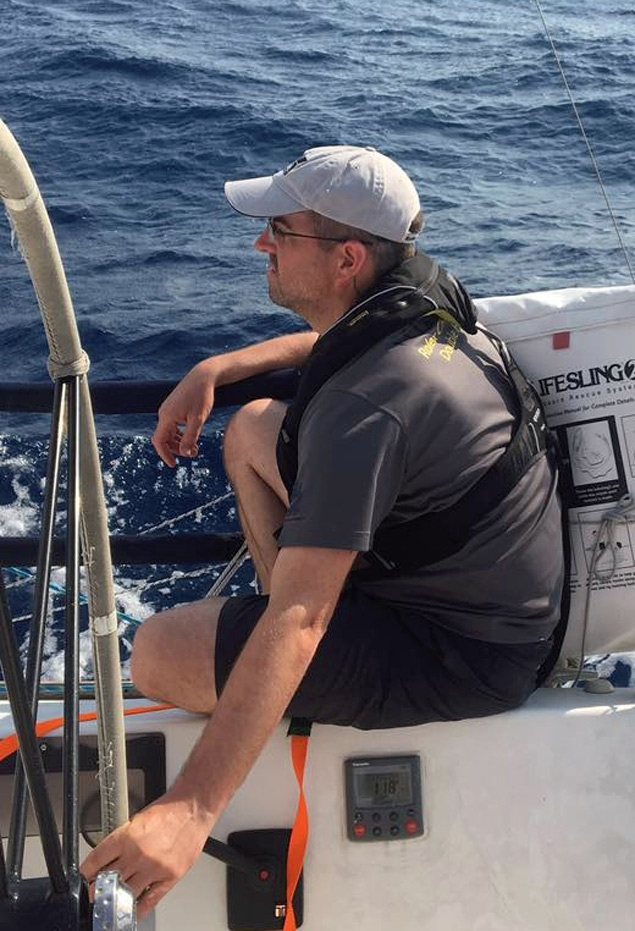 Barry Hayes at the helm
Barry Hayes at the helm
This is the biggest loft in the entire group, and right at the cutting edge of innovation – in 2011, this was where UK started making Titanium sails. It was another significant learning curve for Barry Hayes, as making fully formed sails is not an easy process, but gradually they got on top of the technology, and worked their way upwards from Titanium sails for 30-foooters to using the same method for Maxis, until by 2014 they were making their first Uni Titanium sails incorporating very thin strands of carbon.
He was also sailing frequently on a wide variety of boats on some very exotic races, while on the professional side, he had become a member of the board of directors of UK International, and with the retirement of ace sailmaker David Yeung, he took over the management in Hong Kong of this main production loft for the entire UK group.
But while management is rewarding in itself, there is nothing quite like owning your own operation, and although he’d done very well in Hong Kong, Barry Hayes still felt the call of Ireland and home. So when Des McWilliam floated the possibility of Barry and his wife Claire becoming directly and very personally involved in the business back in Crosshaven, a new direction in their lives began to emerge.
Claire Morgan started sailing at the age of 15 on the south coast of England, and when she went to Cambridge University, it was to study Computer Science. This qualified her for an attractive job in Hong Kong, where she is now a senior manager in HSBC Global Banking and Markets. She resumed sailing, though this time with boats with offshore participation thrown into the equation. She also raced successfully in-harbour with the Etchells 22 and the local class of Ruffian 23s.
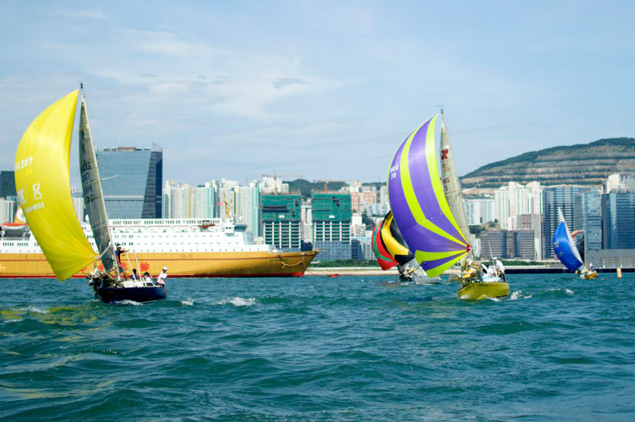 A distant place that will be forever County Down. The Portaferry-built Ruffian 23s continue to be an active class in Hong Kong, and they’re among the boats in which Claire Morgan has achieved success
A distant place that will be forever County Down. The Portaferry-built Ruffian 23s continue to be an active class in Hong Kong, and they’re among the boats in which Claire Morgan has achieved success
But when work permitted (and the work-ethic of Hong Kong is ferocious), Claire was to be found offshore racing in some formidable craft on some very demanding events and frequently at the front of the fleet, so much so that her talents enabled her to take in sailing in Europe including visits to Ireland.
So she is well-informed on what is involved in taking on the ownership and running a leading sail-loft, and hopes that if anything it will increase her sailing opportunities. Certainly the new partnership are mustard keen to build on the UK/McWilliam story and potential, and they undoubtedly have the skill set to do it. As for the remarkable legacy they’re taking on, Des McWilliam has emphasized that while there is indeed a legacy and a notable history, the emphasis has to be on the present and even more on the future, and he has outlined what he sees as the core values of UK/McWilliam:
- People buy from people. Our strength is not technological bullshit, it’s service, quality and people. It’s all people-driven, with a long-standing assurance of service. “Small enough to take care of you, big enough to take care of the opposition”
- We look on ourselves as 30% great history, but 70% great present and great future
- Right now, that 70% is about the new people, the transfer
from me to them, and the immediate success of Graham winning the Sovereign’s Cup last week on Fool’s Gold with sails made by Barry. - While we share the international network, we also pride ourselves on being a proper sail-loft regularly doing in-house designing, cutting, building and servicing of sails for our customers. We are not ‘sailsmen’, we are sailmakers. We don’t pull a handle and pump out another Mermaid mainsail clone, we design each luff curve to suit the individual mast.
- The c.50 sail lofts in the UK International Group are all owned and managed by hands-on sailmakers. No group-think dealerships here. The strength of UK is in sharing our vast accumulated expertise and knowledge. If we come across a new problem, we can quickly source the solution.
- If you don’t need it, we won’t sell you it. Up-selling is not our style.
The newly-formed UK Sailmakers Ireland team will be at Dublin Bay for next week’s Volvo Dun Laoghaire Regatta, and they’re planning to meet customers new, old and potential – and get in some real sailing too. An exciting new chapter is beginning in an already great story.
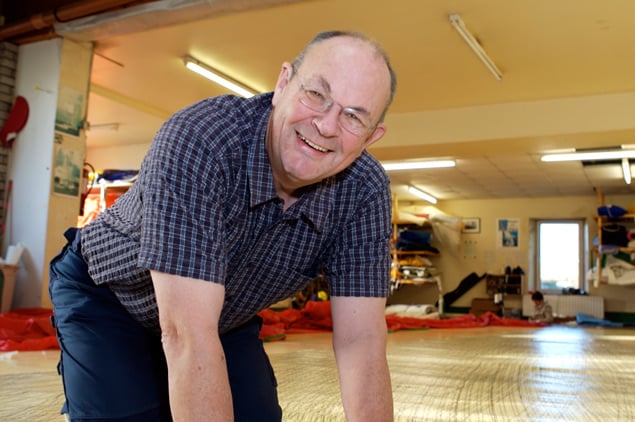 “If you don’t need it, we won’t sell you it. Up-selling is not our style”. Des McWilliam is handing on a clearcut business philosophy. Photo: Robert Bateman
“If you don’t need it, we won’t sell you it. Up-selling is not our style”. Des McWilliam is handing on a clearcut business philosophy. Photo: Robert Bateman
New Sailmaking Website for Dun Laoghaire Loft
#sailrepair – Long standing Dun Laoghaire marine firm Downer Sails has launched a new company website to promote its many sailmaking services including the loft's well known express sail repair service.
The new site features an interesting alteration section where where Downers claim they can 'make old sails like new'.
A number of other timely services are also offered including a winter valet where sails are washed and stored. The service includes pick up and collection from marinas and yacht clubs.
Check out the new site here at www.downersails.ie


























